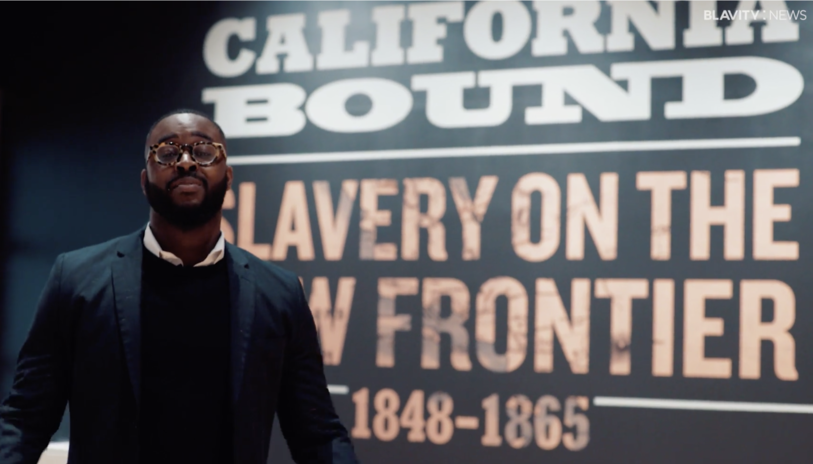The California African American History Museum has an important exhibition exploring slavery in California, and Blavity was there to take a tour of it with museum curator Tyree Boyd-Pates as our guide.
"California Bound: Slavery on the New Frontier, 1848-1865" delves into California’s long history with slavery, beginning with the enslavement of Native Americans by Spanish settlers.
The state’s slaves were briefly freed while the land was a part of Mexico following Mexico’s independence from Spain, but once the U.S. seized large swaths of its southern neighbor (including what is now California) following the Mexican-American War, slavery was once again alive and well on the West Coast.
The discovery of gold in California only swelled its population of enslaved people as slave-owning speculators from the South rushed West, bringing their slaves with them.
In 1849, one year after the rush began and one year before the California territory became the U.S.’ 31st state, lawmakers crafted the territory’s first Constitution, which said, “Neither slavery, nor involuntary servitude, unless for the punishment of crimes, shall ever be tolerated in this State.”
Blavitize your inbox! Join our daily newsletter for fresh stories and breaking news.
What the Constitution said and what was enforced were two different things, unfortunately. Prosecutors rarely raised a hand against slaveowners bringing slaves into the state, and laws were passed allowing slaves to remain slaves as long as their masters didn’t take up permanent residency.
Boyd-Pates explains California gaining statehood further complicated the status of the state’s slaves.
There was some pushback from other states about California entering the Union, as it wanted to join as a free state, which would tip the ratio of free to slave states in favor of those allowing for emancipation. Boyd-Pates tells us a compromise was hammered out to appease slave states that led to a new federal fugitive slave law.
The law gave slave owners wide-ranging powers to recapture escaped slaves, particularly those that had escaped to free states. Abuse of the law led to many emancipated people being illegally sold back into slavery or even being sold into slavery for the first time.
In California, this meant free Black people, including those who’d bought their freedom after finding gold during the Gold Rush, were continuously in danger of once again becoming slaves.
As was the case with the Constitution, California’s status as a free state was widely ignored by slave owners, including by the owner of a slave Boyd-Pates focuses on during the last part of his tour, Bridget “Biddy” Mason.
He explains Mason was brought to California by her master; through lies, manipulation and bribes, she and other slaves owned by her master were illegally kept in bondage for years. After a group of free Black Californians finally helped Mason win the freedom that was lawfully hers, she thrived.
As a free woman, Mason used her natural talents with medicine and midwifery which her master had exploited for his gain for her benefit, becoming a skilled and sought-after midwife and nurse. She then used the money she earned to become a Los Angeles real estate mogul, later using her fortune to found and support a major Black church.
Ultimately, the stories Boyd-Pates tells serve as a sad reflection of the reality of slavery in free states, but also feature personalities like Mason worth celebrating. He works to link past and present, both through stories of adversity and through looking at the law, reminding us at tour’s end that the 13th Amendment continues to hold some Americans in bondage to this day.
Check out the full tour for yourself above, and if you are fortunate enough to be in Los Angeles this Black History Month, be sure to visit the California African American Museum to see "California Bound" and the museum’s other excellent exhibitions in person.
Now, check these out:
